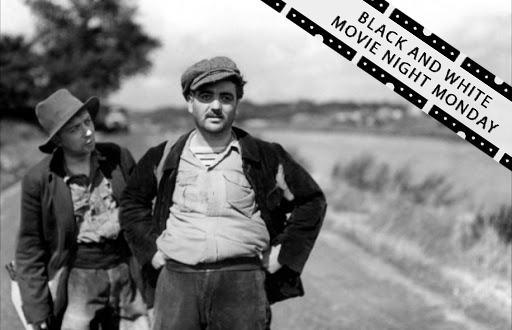
Freedom For Us is the English translation of this wonderfully delightful French classic. Thanks to Criterion Channel’s “Essential Arthouse” list, I was lucky enough to discover this gem! It’s a comedy that manages to tackle heavy themes of friendship, the working class, and (you guessed it) freedom. The film opens in a place devoid of freedom: a prison in which its inhabitants work all day on an assembly line mindlessly building toy horses, (a job that would later be replaced by machines.) As they work, they sing in unison “Liberty is the happy man’s due…”. In the midst of this, there are two men, Emile and Louis, who do not sing, but instead wink at each other, knowing they have a plan of escape. They know this is not freedom, and they will do whatever it takes to get out. Without any delay, in the next scene, we see their escape underway, and as they saw away at their bars, they sing another song about what life can be as the score soars behind the voices. Is this a musical? Sort of… although the consistency of musical numbers are not kept throughout the film. But who cares? It’s got to be the most whimsical, innocent prison escape scene ever put to film.
But as they try to escape, the guards close in and only Louis is able to make it out while Emile falls behind, sacrificing his freedom for his friend’s. After that, the movie jumps forward in time with brilliant match cuts that show Louis out in the real world. He ends up rising to power through the production of phonographs, eventually becoming a significantly wealthy and prosperous man, owning the assembly lines that mirror the ones he used to work on in prison. But he does he truly have freedom? After a while his old friend Emile returns after a failed suicide attempt that ends up breaking his prison bars and ironically setting him free. (I told you there were heavy themes). Soon enough, Emile finds himself working for Louis’s factory and is overjoyed when he recognizes his old friend as the wealthy business owner who is now disguised in a snazzy top hat and moustache to hide his true identity as an escaped convict. But Louis’s newfound freedom becomes threatened as more and more opportunities come for his criminal past to be leaked, meanwhile Emile blissfully continues along with life, searching for freedom he has yet to find, chasing a beautiful girl who also works in the factory. So much brilliant irony there that it would make any screenwriting professor happy. But this film doesn’t impress just on a witty plot alone.
The use of repeated imagery is superb in this film, and the magnificent sets and cinematography would be incredibly impressive by today’s standards. Also, how can I forget to talk about the two leads played by Henri Marchand and Raymond Cordy. They perfectly execute comedic timing while adding real depth to their characters. Both of these actors essentially act with dialogue and without. For many sequences, the film plays out like a silent film, where all the emotion and comedy is purely physical. This is no easy feat, but it’s accomplished incredibly here.
In short, everything works in this film and it’s completely full of joy. One of my favorite elements was seeing the two friends Emile and Louis reunite after nearly a lifetime of being apart. They’ve made it out of jail, but freedom seems to still elude them. However, when they smile and laugh together, none of that seems to matter. Perhaps true freedom is found in a deep bond with a friend. It certainly can’t be found in money, in work, or in prison, which at the end of the day all end up keeping these characters enslaved. The film suggests that freedom is found in something much more lighthearted: a wink, a nod, a laugh with someone who shares a connection with you. Maybe that’s all it takes to set you free.
